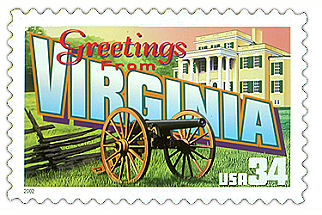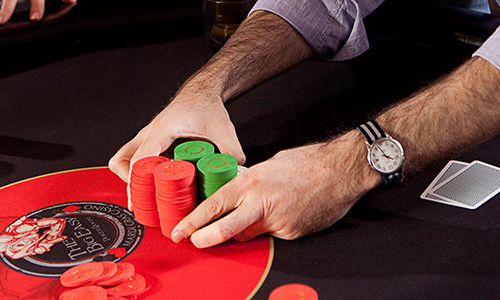Virginia Poker Legalization Bill Introduced, Internet Lottery Shot Down
Much of the talk of gambling expansion in the United States – be it online or brick-and-mortar – in the last couple years has revolved around the Mid-Atlantic States, states like Delaware, Pennsylvania, New Jersey, New York, and Maryland. As you move further south, gambling prevalence goes down. Virginia, the state immediately south of the ones mentioned, for example, barely has any legalized gambling. There is the ubiquitous lottery, but that’s really it. State Senator Louise Lucas would like to change that, though, having recently introduced a bill to legalize poker in the Commonwealth.
 Before any of you Virginians get too excited, keep in mind that we are not talking about online poker here. Lucas’ bill, S 1400, deals with land based poker games, not the internet variety. In legalizing poker, it would insert a sentence into the legal code that would classify poker as a game of skill and specifically remove it from the illegal gambling category. The sentence is straight-forward, reading, “Poker games shall be deemed games of skill, and nothing in this subdivision shall be construed to make any such game illegal gambling.”
Before any of you Virginians get too excited, keep in mind that we are not talking about online poker here. Lucas’ bill, S 1400, deals with land based poker games, not the internet variety. In legalizing poker, it would insert a sentence into the legal code that would classify poker as a game of skill and specifically remove it from the illegal gambling category. The sentence is straight-forward, reading, “Poker games shall be deemed games of skill, and nothing in this subdivision shall be construed to make any such game illegal gambling.”
For reference, the current definition of illegal gambling is:
“Illegal gambling” means the making, placing or receipt of any bet or wager in the Commonwealth of money or other thing of value, made in exchange for a chance to win a prize, stake or other consideration or thing of value, dependent upon the result of any game, contest or any other event the outcome of which is uncertain or a matter of chance, whether such game, contest or event occurs or is to occur inside or outside the limits of the Commonwealth.
As the above paragraph is worded, there could actually be some room for interpretation as to whether or not poker would be considered illegal gambling. The phrase “dependent upon the result of any game, contest or any other event the outcome of which is uncertain or a matter of chance” could mean that poker is illegal because, as we well know, chance is most certainly involved. At the same time, however, one could interpret it to mean that poker is kosher in Virginia, as it doesn’t say “outcome of which is at least partially uncertain or a matter of chance.” It could be seen as an all or nothing.
Unfortunately, courts have been using the former interpretation, hence the need for Lucas’ bill. For instance, in 2010, a Portsmouth, Virginia judge ruled against a defendant who filed a lawsuit when the Portsmouth Commonwealth’s Attorney closed his poker halls which raised money for charity. Naturally, the judge cited the “outcome which is uncertain” part of the law and the defendant was unable to reopen his poker halls. The defendant appealed to the state’s Supreme Court, which decided not to rule on the skill question.
Senator Lucas Really Wants This
Sen. Lucas has been trying to get the state legislature to authorize a casino gambling industry for a number of years. In November, she and state Senator Scott Surovell wrote an op-ed for the Richmond Times-Dispatch explaining how beneficial legalizing gambling beyond the state lottery would be for the Commonwealth. A major impetus for the timing of the piece was the opening of the MGM National Harbor casino in December, just a few minutes from northern Virginia and Washington, D.C.
“MGM anticipates that nearly half of its business — $350 million per year — will come from Virginians,” the two Senators wrote. “The Virginia Lottery’s senior economist estimates that the state’s lottery will lose $15 million to $30 million in sales and $5 million to $10 million in profits per year starting next year because of the MGM casino.”
They went on to present numbers showing how significant gambling could be for the state in terms of revenue and jobs, even bringing up fantasy sports as an option.
“While we could choose to continue helping Maryland, West Virginia and New Jersey’s taxpayers, we could also choose to start diversifying our revenue sources and keeping our money, tax revenue, and jobs right here in Virginia,” they concluded.
Online Lottery Sales Not Happening
Speaking of lottery and gambling expansion, a bill which would have allowed for internet lottery ticket sales in Virginia was defeated this week by a House Committee on General Laws subcommittee. A coalition of convenience store owners rallied hard against the bill and their argument sounded fairly reasonable.
“It’s bad for business,” 7-Eleven lobbyist Chuck Duvall told local media. “Customers don’t just buy lottery tickets. They buy cigarettes. They buy soft drinks. And sometimes they buy beer. And all of those are higher markup items than the lottery ticket. So if we don’t have that body in the door, we are probably not going to sell those other products.”
The thing is, in the states where internet lottery sales are allowed – Georgia, Illinois, Kentucky, and Michigan – this cannibalization doesn’t happen. Online lottery players tend to be younger, the types of people who weren’t frequent lottery ticket buyers in the past.
The lottery tried to negotiate daily game exclusivity for brick-and-mortar stores (as opposed to Powerball and Mega Millions, which are drawn twice per week), but there were no takers on that deal.



















COMMENTS